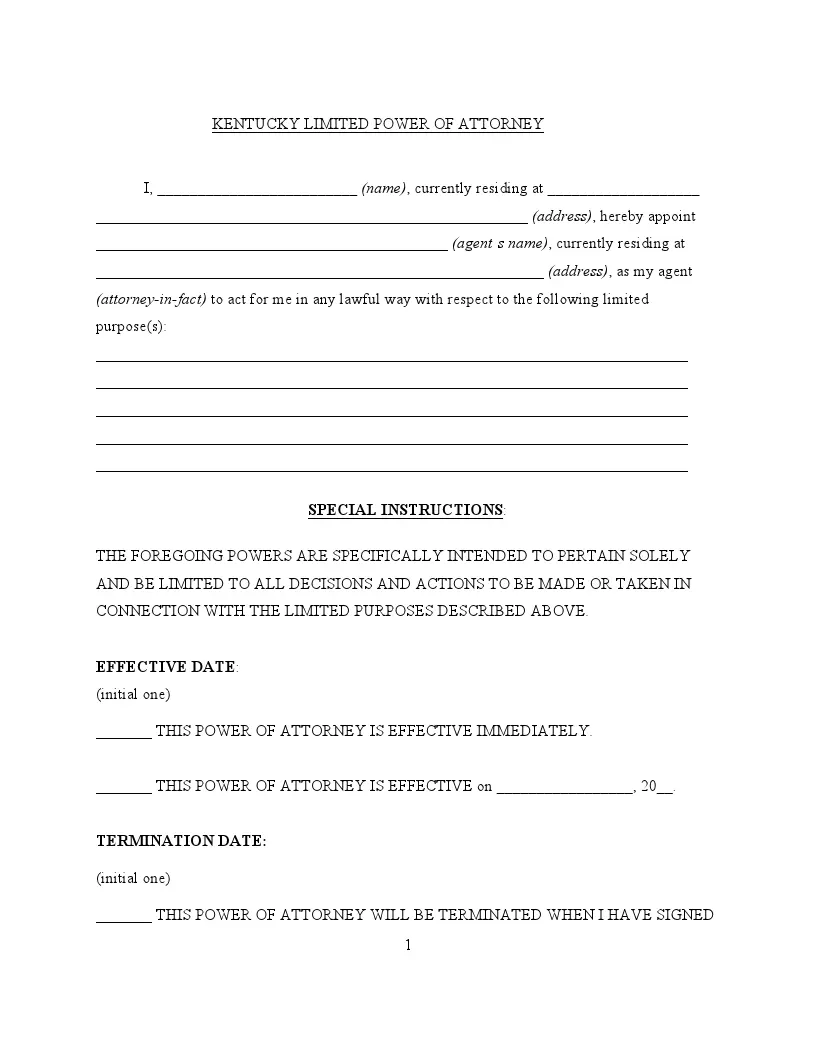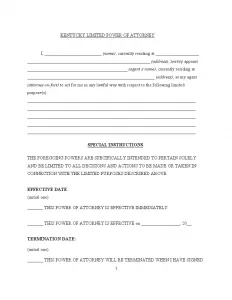Kentucky Limited Power of Attorney Form
The Kentucky limited power of attorney is a legal document that allows someone, known as the agent, to act on behalf of another person, the principal, under specific conditions. This type of power of attorney is tailored for situations where the principal needs an agent to manage certain aspects of their affairs but wants to restrict the scope of authority. It can be confined to a certain timeframe, limited to specific areas of decision-making, or applied only to designated transactions.
For example, a principal might authorize an agent to handle financial transactions related to a stock portfolio during a month-long trip abroad or to sign a real estate contract in their absence. This ensures that the agent can act in the principal’s stead for precise tasks or during specific times, providing flexibility while maintaining control over important decisions.
A limited power of attorney in Kentucky requires careful drafting to ensure compliance with local laws. Use Kentucky power of attorney forms tailored to meet the state’s legal requirements.

Build Your Document
Answer a few simple questions to make your document in minutes
Save and Print
Save progress and finish on any device, download and print anytime
Sign and Use
Your valid, lawyer-approved document is ready
Under the Kentucky Revised Statutes, particularly Section 457.050, there are precise requirements about how a power of attorney must be signed and acknowledged:
- The principal must sign in the presence of a notary public.
- The notary must verify the identity of the principal.
- The notary ensures that the principal understands the document and signs it voluntarily.
This notarial acknowledgment also helps to prevent fraud and ensures that the document is considered credible and authentic in legal proceedings.
Furthermore, Section 457.245 of the statutes clarifies that an appointed agent can only act within the limits granted explicitly by the principal in the power of attorney document. This section emphasizes the need for the document to clearly outline the scope of authority granted to the agent, ensuring that the agent acts only within the parameters set by the principal.
Kentucky Limited Power of Attorney Form Details
| Document Name | Kentucky Limited Power of Attorney Form |
| Other Name | Kentucky Special Power of Attorney |
| Relevant Laws | Kentucky Revised Statutes, Section 457.245 |
| Avg. Time to Fill Out | 8 minutes |
| # of Fillable Fields | 32 |
| Available Formats | Adobe PDF |
Filling Out Kentucky Limited POA
Creating a limited power of attorney in Kentucky allows you to appoint an agent to act on your behalf in specific circumstances. This legal document must be filled out carefully to ensure all provisions are clear and legally binding.
1. Fill in the Principal’s Information
Start by entering your full name where it says “principal name.” This identifies you as the principal who is granting the power of attorney. Next, provide your Social Security Number in the designated space. Ensure this information is accurate to establish your identity in the document.
2. Designate Your Attorney-in-Fact
Enter the full name of the person you appoint as your attorney-in-fact (agent), followed by their complete address and phone number. This person will have the authority to act on your behalf as specified in the document.
3. Specify the Powers Granted
Detail the specific powers you are granting to your attorney-in-fact. Use the spaces provided (1 to 5) to clearly describe each act they are authorized to perform on your behalf. Be as specific as possible to avoid any ambiguity regarding their responsibilities.
4. Set the Conditions for Power Termination
You must initial and check the boxes that apply to how and when a power of attorney will terminate. These options include termination by your revocation, completion of the designated acts, or on a specified date. Fill in the date if you choose termination on a specific date.
5. Sign and Date the Document
As the principal, sign the form in the designated area and print your name below your signature. Enter the date to confirm when the document was executed, which is crucial for it to be considered valid and effective.
6. Acceptance by the Attorney-in-Fact
The Attorney-in-Fact must also sign and print their name under the “Acceptance of Appointment” section to indicate that they agree to undertake the responsibilities as your agent according to the terms specified.
7. Notarization
The document must be notarized to be legally binding. Present a government-issued photo ID to the notary public. The notary will verify your identity and witness your signature, then complete their section of the form, which includes their signature, the date, and when their commission expires.
